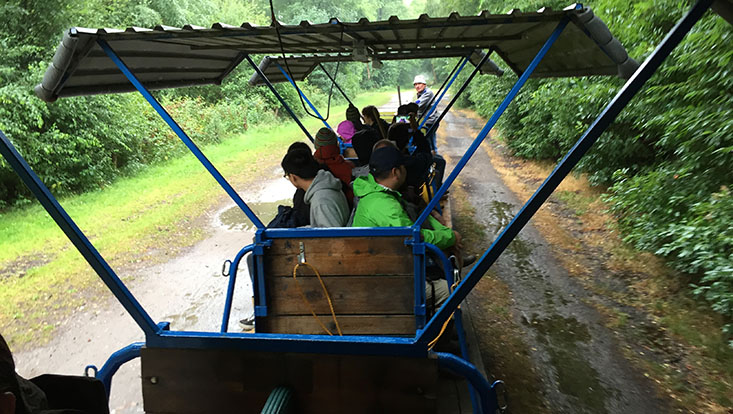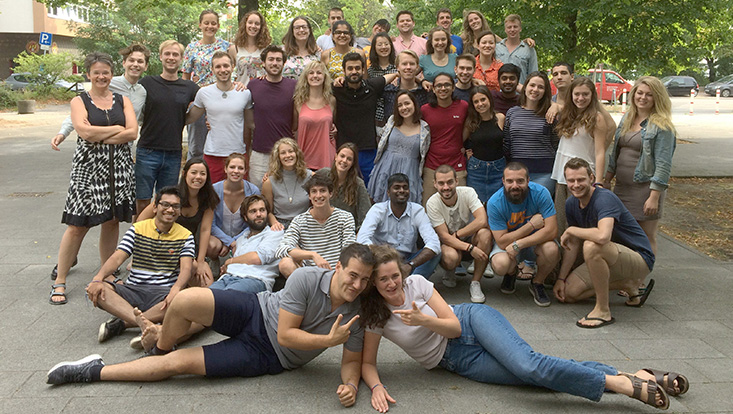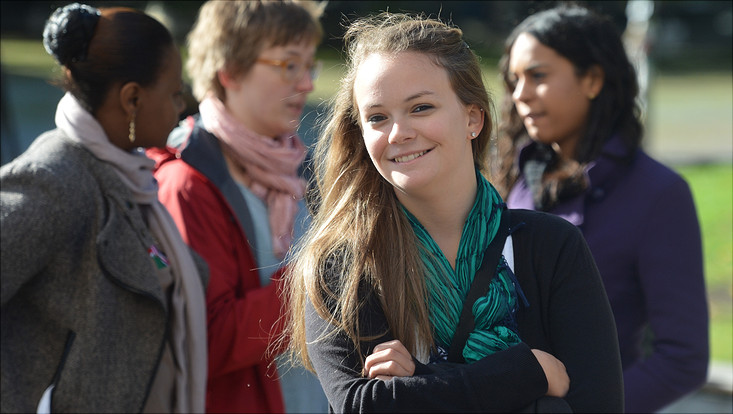International Summer School „Climate Change“International Summer School: Experiencing climate research firsthand
25 July 2018, by Lisa Wolf

Photo: UHH/CEN/Harms
Learning how to understand our climate from experts? Digging in a bog to gather field data? Universität Hamburg’s international Summer School “Climate Change” offers young scientists the chance to experience four weeks of climate research in Hamburg. In the following, three participants share their experiences.
Kevin Thellmann from Stuttgart is currently pursuing his doctorate in Agricultural Sciences at the University of Hohenheim. He already holds a Master’s in Earth System Science and a Bachelor’s in Renewable Resources and Bioenergy (BSc).

“In my dissertation, I model ecosystem services: natural processes that greatly benefit human beings, like bees pollinating flowers. Ideally, in the future I would like to integrate climate change into my models, since it affects many of these processes. That’s not going to be easy – I’ve already learned that much (laughs). That’s why I’m especially looking forward to the last week of the Summer School: then we’ll use two different models to practice modeling the climate and interpreting the results.”
.
Liisa Andersen is currently writing her dissertation in Immunology at the Medical University of Vienna. At the same time, she has begun a Master’s degree program in Environmental Science.

“I personally find climate change an amazing topic, because its unprecedented, global and all-encompassing scale makes it truly unique. In my opinion, climate change is the first problem humanity has faced that can only be solved if all academic disciplines, plus the political and commercial sectors, do their part. As such, what I most enjoy about the Summer School and the research conducted here in Hamburg is the interdisciplinarity – it’s fascinating to see how experts from a broad range of fields join forces here. You can also see this in our group: it’s highly diverse and international. At first I was a bit concerned that, because of our different backgrounds, the content would only be covered very superficially, but just the opposite is true: the quality of education is outstanding. I’m confident that much of what I’ve learned here will benefit me in my future career.”
Stefan Bergmann from California is currently working on a part-time working professional Master of Business Administration degree at the University of California Davis. He has a Master of Science in forest resources.

“I am particularly interested in social businesses, environmental and forest issues. Therefore, climate change is an important—if not the most important—topic. In my current job as certification forester it does not yet play an important role—I would like to change that in the future. What I like best about the program of the summer school are the different field trips. During these trips, for example to Himmelmoor, we get to see research on the ground. For the following days, I am looking forward to the trip to the North Sea. It is my first time in Germany and I have brought my son with me. Together we are enjoying the time in Europe.”
Additional information
The Summer School “Climate Change 2018” will take place from July 2 to 27, and will be co-hosted by the Center for Earth System Research and Sustainability (CEN), Max Planck Institute for Meteorology and German Climate Computing Center (DKRZ). Undergraduate students, PhD candidates and young professionals from Europe, Asia and America will come together for a look behind the scenes of climate research. The Summer School is especially intended for young scientists, Master’s students and PhD candidates with a solid background in the geo- or Earth system sciences, including physics and mathematics.
The Summer School is part of the “Hamburg International Summer Schools” program, which was launched in 2017 by Universität Hamburg’s International division and is offered in close cooperation with various faculties and extra-university research institutes. The portfolio, which includes e.g. the Summer Schools “Health Economics 2018” and “Particles, Strings & Cosmology 2018,” is especially oriented on the needs of international students and researchers, and introduces them to Universität Hamburg’s primary research areas.


